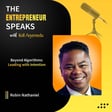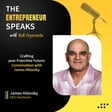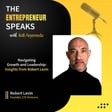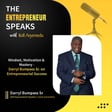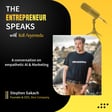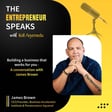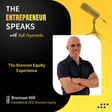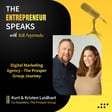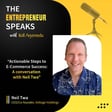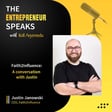Become a Creator today!Start creating today - Share your story with the world!
Start for free
00:00:00
00:00:01

A Conversation on Enduring Entrepreneurs
In this second part of the two - part series, Jill J. Johnson , President and Founder of Johnson Consulting Services talks about strategies businesses can adopt to stay in business for a long time.
Enjoy this conversation on enduring entrepreneurs.
Don't forget to like and subscribe .
Transcript
Introduction to Enduring Enterprises
00:00:09
Speaker
Welcome to another exciting episode of the Entrepreneurs' Facebook cast. I'm your host, Kofi Animadu. Today, I'm joined by Jill Johnson.
00:00:20
Speaker
the president and founder of Johnson Consulting Services. In our first episode, she talked about her entrepreneurial journey and she shared a lot of nuggets of wisdom with us.
Strategies for Business Longevity
00:00:35
Speaker
In this second part of our conversation, she will be helping us understand how as businesses
00:00:42
Speaker
How as entrepreneurs, how as enterprises, we can endure and be in business for a very long time. So she'll be tackling this important topic of enduring enterprises. She'll be giving us some tips and strategies that we can adapt on our quest to grow businesses that can stay for a very long time. Welcome to my show, Jill.
00:01:09
Speaker
Oh, thanks so much. Kofi is glad to be back again. And I can't wait for this part of our conversation.
00:01:15
Speaker
It's exciting stuff and I'm going to write another book on this content as well. So I love every opportunity to have a conversation about it. Okay. Thank you so much once again. And so let's start off with some definitions or your perspectives on the subject matter. So when we talk about enduring enterprise, an enduring entrepreneur, what do these concepts mean?
00:01:40
Speaker
So for me, it's really about building a business or an enterprise that stands the test of time. If you think about, you know, in the U.S., for example, they say only what about 20 percent of businesses survive five to 10 years. And, you know, as I've looked at business statistics over many years, very few businesses ever last 20 or 30 or more years.
00:02:08
Speaker
And there are so many reasons behind it. And as I've studied business, both with clients and other research that I've done, it's pretty clear that those that do succeed over that longer period of time are very different. And as we talk today, I've identified eight different factors. I don't know that we'll get through all eight, but there are eight factors that we've identified and I've identified and we'll be talking about in that future book.
00:02:38
Speaker
that really make the difference in terms of whether a business succeeds over the long term or whether it loses its gas and runs out of steam. Thank you so much. And I'm sure in our conversation you would help us appreciate these eight strategies. Yes. All right. So what does it take to develop an enduring enterprise?
00:03:02
Speaker
Well, so let's start at the very beginning.
Vision Alignment and Skill Development
00:03:06
Speaker
And I think that one of the key elements of it is the vision. You know, how do you see yourself going forward in the future? What do you see yourself as that leader? My perspective on that really started as I was working with boards of organizations,
00:03:26
Speaker
Some would have this grandiose vision for the future that was so lofty and so aspirational, if you will, that it wasn't possible for their small little team to achieve that goal, to achieve that vision. And so what I encourage people to do is to have that bigger vision
00:03:49
Speaker
But it needs to be grounded in some level of reality. When we talked in our previous interview, I said that I was the chief reality officer often for my clients, that's CRO. And for vision, I think a lot of times that vision really sets the stage for the business and all of the business strategies need to be working in tandem.
00:04:15
Speaker
in order to be able to achieve that vision. And so sometimes people will say that we're going to dominate our market. Well, what does that really mean? They need to have more clarity around what it means to dominate the market, dominate it in sales, in service, in delivery outlets, or however that might be. And what is your market when you say dominate your market?
00:04:45
Speaker
here in the city of Minneapolis, is it in the country of Ghana? Is it the whole US or the whole world? Or is it intergalactic? I mean, what's the scope of how big that will be? And I think that having that sense of vision is very important. I had an entrepreneur that I worked with years ago
00:05:06
Speaker
And he was not a successful entrepreneur. And I was doing a little bit of work with him, but I wasn't sure that I was going to continue to work with him because
00:05:17
Speaker
He wouldn't listen. And finally, one day I just said to him, what's your vision for the future? And he said, well, I'm going to be a billionaire. I'm like, okay, that's a great vision to have, but what are you doing day to day to even be a $50,000 heir?
00:05:36
Speaker
He wasn't even successful in these small little things that he was doing. So his ability to execute and to achieve that big vision was there was just no pathway for it unless he did things very differently. And nobody had ever quite called him on that. And it was kind of a
00:05:57
Speaker
a moment of truth for him, if you will, that he had this idea, but nothing was working to make it, to accomplish it.
00:06:07
Speaker
I asked that same question of a young person I was mentoring when he was 26. I just said, hey Brian, who are you going to be when you're 40? Who's that guy that I'm going to sit in the office of and I'm going to talk with? We're talking about, for him, it was 15 years in his future.
00:06:27
Speaker
I didn't think a whole lot of it because it was a question for him to work on and reflect on. And he came back later and he said that that was such a powerful question for him because once he had that vision of who he wanted to be, then all of the different elements of how to execute
00:06:48
Speaker
his day-to-day strategies became so much clearer because they were all working to get him to that ultimate path and he's 42 now and he is the guy that he talked about who he wanted to be at 26 at 42 because he had great clarity about it. Now the key thing is reorienting the dream to who does he want to be at 60.
00:07:10
Speaker
And so that big vision for a business is knowing because that sets the pathway. Okay. What are some of the key characteristics of enduring enterprises and how do they differ from short-term success stories? So one of the other elements of an enduring enterprise or an enduring entrepreneur
00:07:36
Speaker
is ongoing skill development. Because a lot of times the things that got you to become an entrepreneur do not make you successful as your business grows and gets more complex. And a lot of times that's where when the businesses fail, it's in part because the entrepreneur hasn't continued to grow. They were often very good at a particular skill when they started and
00:08:05
Speaker
But they didn't learn the business parts of being an entrepreneur of a successful business. And a lot of them want to just hire it out or have, well, I don't need to learn about money because my accountant or my bookkeeper can do that. But yet, you need to understand those elements. And you don't need to be an expert at it, but you need to have some familiarity with it. Same thing for understanding
00:08:35
Speaker
things like human resource management. The thing that kills most businesses is they hire the wrong people, and they keep the wrong people in their jobs vastly longer than they ought to. The best advice I ever heard, and I try and implement it within my own business, whether it's working with an intern or a vendor, is
00:08:56
Speaker
hire slow, fire fast. And if it's not working, you need to get out of it and move on instead of trying to magical think, well, make it better. And it just doesn't always work that way. But the same thing holds true for the entrepreneur. And you need to have good skills of your own, and you need to continue to expand in your business acumen
00:09:20
Speaker
If you're going to do it, we see the same thing, whether you're a growing nonprofit business or a trade association or anything else, the skills of your team of you and your team also have to continue to grow. And sometimes you're going to need to, to buy new talent that has skills that you don't have or can't get.
00:09:42
Speaker
or can't grow as you look to expand. And so I think as you break down the whole perspective of what do you need to grow and operate and sustain that business over time or that enterprise over time.
00:09:58
Speaker
Skills is a really critical element of what works and what doesn't work. Okay, so in your earlier submission, you talked about vision and its role in building an enduring enterprise. But how can business leaders balance their need for short-term results with the long-term vision required for building an enduring enterprise?
Balancing Planning and Vision
00:10:20
Speaker
Well, I think it goes to one of the other pillars of enduring enterprises and that's planning. You need to do disciplined business planning, business and strategy planning.
00:10:33
Speaker
on an ongoing basis, not just once every three years or once a year. Most entrepreneurs do all of the business plan activity when they're starting their business and they never go back and reassess it as the business begins to grow and develop and they have some successes because it's that discipline of going back and looking at
00:10:57
Speaker
your information and where is your success coming from and what is it that you need to adjust or modify that will allow you to continue to be successful is so essential. And I find that organizations that look at planning as something that they're always engaged in, they're always looking for opportunities
00:11:24
Speaker
how to do things better, how to create new opportunities. And for example, looking at your client mix, a lot of businesses get really excited because they get one really big client and it's maybe 60 to 80% of their business.
00:11:44
Speaker
And it's going really, really well. But then the client has a staff change or the CEO changes and they decide to hire somebody else. And all of a sudden, your business is gone. That bulk of business is gone because you weren't diversified in your revenue stream. And you had no activity in your pipeline that was setting up the stage for that more diverse
00:12:09
Speaker
new client portfolio. And so if you were doing ongoing planning, you would recognize your risks and business vulnerabilities, and you would be working on mitigation strategies that would help you minimize the impact that those risks could have. You would be working on tactics that were trying to expand the outreach that you had for
00:12:35
Speaker
new business or looking for different employees or looking for expansion opportunities or thinking about if I have to cut my my business by 25 percent because we lose something what's my protocol for how I'll do that and begin to play those what if games that scenario planning we call it and but most people don't bother to do that because they're just in the moment of whatever is going on today
00:13:03
Speaker
with their business and for most companies and most entrepreneurs
00:13:09
Speaker
And frankly, a lot of organizations, the planning horizon is 12 to 36 hours. They're looking at today, tomorrow, and maybe the night after. They're focused on the immediate term. What planning does is it forces you to take that longer term view. And if you combine that with really recognizing and reflecting on that vision,
00:13:35
Speaker
and getting in the discipline of working on those two elements in tandem, you have a much greater likelihood of anticipating problems before they occur. You've anticipated strategies of how you'll work with complex problems long before they actually happen so that you'll know exactly what you need to do. If you think about airline pilots, they go through simulation training
00:14:02
Speaker
of bad case scenarios, that worst case scenario, if you will. And when I'm doing business planning with clients, we do scenario planning. We look at best case, worst case,
00:14:16
Speaker
expected case so that they can understand the impact if their strategies don't succeed so that they don't blow up the business because they've thought through it in a much more comprehensive way. But those that are successful over the long term are always engaged in planning. Now they may not uproot everything that they've got in play
00:14:38
Speaker
but they're always thinking ahead. They're always looking at how is that going to be affecting what we do with our vision. Okay, thank you so much Jill. So what role do company culture and value play in creating and enduring enterprise?
Company Culture and Growth Challenges
00:14:55
Speaker
Well, you know, there's so much emphasis on company culture
00:15:00
Speaker
in today's world. And I don't think people are necessarily as effective at it. And I think culture within businesses that succeed over the long term are cohesive. People are working collectively, not against each other. They're working in a collaborative manner to achieve the same goals and objectives. They understand what
00:15:28
Speaker
how they all fit together and what they're doing. And they come together in a way that I define in the end of the pieces of the enduring enterprises is they create substance in the business. It's not the business isn't all just fluff and mirrors and BS. It's
00:15:48
Speaker
There is a substantive approach to the quality of what they do and offer, the work that they do and offer. And that ties to culture because the employees are taking pride in how they are creating whatever it is they're doing. And it may be the safety. So for example, I have a colleague I know out in California and it was a family owned orchid.
00:16:16
Speaker
grower, nursery, if you will. Orchids are notoriously difficult to grow. They have this amazing business, but their culture of how the employees come together and work around, they have certain major holidays a year where a significant portion of their product goes out.
00:16:41
Speaker
and the safety elements that have to be in play. And the team works collectively. They work together. They look out for each other. They support each other. And when you do that, you create substance in the business. You create substance in what it is you're selling to your clients.
00:17:03
Speaker
You create a culture where people have value and they value the role that they have in the company. And I think that's so exciting when they can see how it comes together. And there's some magic that happens, I think, when
00:17:19
Speaker
when it's all working together. And then when you combine that with the planning and the vision and the skill development of your team, all of a sudden you now have this really robust enterprise. And that type of enterprise is well-primed for lasting success over the long term. That's deep. So what are some common mistakes that companies make when trying to build?
00:17:48
Speaker
enduring enterprises and how could these mistakes be avoided.
00:17:53
Speaker
So this leads to another one of the elements and that's controlling growth. A lot of there's been, there's two elements to the two elements that tie together on this. And so if we look at growth, you know, everybody is like, Oh, we want to grow our business and we want to get to a, you know, a million dollars as quick as possible. And, you know, so there's, you know, buying new equipment and they're spending money and, and they just haven't really got the processes set in place. They don't have,
00:18:21
Speaker
the clients in place and what ends up happening is they oversell and then all of a sudden now they can't deliver so their reputation damage is done because they you know we all know businesses that over promised and under delivered and it also ties to to one of the other elements and that's money you have to have
00:18:46
Speaker
good fiscal management if you're going to build an enterprise that stands the test of time. Because without good money and good mindset about what to invest in, how frequently to invest in, how often you can end up putting the business out of business because there's no money to get you through
00:19:08
Speaker
those days when the cash isn't coming in. We've all had a client that didn't pay us when they were supposed to. And if you don't have any money in the bank to be able to cover your day-to-day expenses, you might end up going out of business. And we all know entrepreneurs that have gone bankrupt
00:19:24
Speaker
because their vision was too big. They spent all this money relative to the vision, but they couldn't execute to achieve it and then had to file bankruptcy because the financial cash flows just didn't work. And a lot of them I've also seen when you get into that growth mode, a lot of times they're now looking for outside money. And so they're looking for money from
00:19:50
Speaker
angel investors, venture capitalists, they're looking for money from private equity. I even had one entrepreneur that I served on a board with who went public with his company and sold stock. And I remember having the conversation when I said, that was a pretty expensive way to get added cash flow to your business. And he just looked at me because nobody had ever said that to him. And he's like, you're absolutely right. I should have never done it.
00:20:16
Speaker
because the idea of what he was doing was, and he had all these advisors around him telling him, oh yeah, you should go public. Because they were all going to make a lot of money off of him if he did because they needed to have the attorneys and the accountants and the other advisors. And then
00:20:35
Speaker
the other firms that did the PR on it to sell the shares and the investment bankers, everybody else was making money. And the guy didn't understand how much loss of control he would have. And that's the other thing that happens when you bring in outside money is you as the business person might think you're going to continue to be in control, but oftentimes when you've got private equity money,
00:21:01
Speaker
You get moved out they bring in their own their own leader to manage the operation and the reason is because the skill sets of being an entrepreneur are often different.
00:21:13
Speaker
than the skill sets of a general business leader. And so if you've been working on your skill, then often you can overcome that. But a lot of times, those private equity firms, they're just looking to acquire the assets, the reputation, the goodwill, and the team that you've put in place. But you may not have that long-time perspective. I've known tons of entrepreneurs that got private equity money and then got moved out.
00:21:42
Speaker
So so I always tell people is control growth and is private equity money bad? Absolutely not it might be an exit strategy for you to consider If you're looking at angel investors that can be your next step for how you look at and build but you just need to fully understand and
00:22:05
Speaker
Again, the risks and the rewards that you're going to be exposed to. And if you're not going to use outside money, then how are you going to build your own cash flow so that you have financial reserves set aside for your rainy day, if you will, so that you've always got that money in the bank that you can weather any storm. And those successful
00:22:26
Speaker
enterprises and the truly supremely successful entrepreneurs that last. I've been in business 35 years and it has not all been sunshine and roses. There have been some periods where there just wasn't a lot of work
00:22:42
Speaker
because our country was in a recession and clients weren't spending outside money. During the pandemic, we had lots of work that was canceled, even though we had signed contracts for it, because the clients needed to cancel those contracts in order for them to survive. But I had money in the bank, so I wasn't worried about it, and I was able to be gracious to my clients and not get into a panic.
00:23:08
Speaker
And I think those two elements of controlling growth and money as you link them together are really fundamental to enterprises that are successful and sustain that success over a long period of time.
00:23:22
Speaker
Okay, so we live in an era where technology is very crucial to the operations and growth of every business.
Technology and Metrics in Business
00:23:30
Speaker
What role does technology play in building an enduring enterprise? And how can companies ensure that they are using technology effectively and also reasonably? Well, you know, technology I would put under one of the other categories that I have for of the eight and that's adapting.
00:23:51
Speaker
We were talking or I was talking to somebody earlier today about the internet. When I started my career, the internet did not exist. My business is different now. I market differently. Things like our podcast. 40 years ago, who would have ever thought that a business owner from Minnesota in the USA would be talking to
00:24:20
Speaker
a podcaster in Ghana, and people around the world would be hearing what we talk about. That is part of what we have adapted to those emerging possibilities.
00:24:36
Speaker
And I think technology clearly falls under that sphere of adaption. And I think that what you have to decide is, are you going to be on the front end of the leading edge of the technology adoption?
00:24:51
Speaker
Or are you going to be a little bit of a laggard and maybe like an early majority adopter or a late majority? But you want the technology to be proven before you're going to throw all your money into it. I tend to fall more into that category.
00:25:07
Speaker
I'm skeptical. There's been lots of things that have come and gone. Think of all the different social media over the years that we get all ginned up and invest in and work on. And then within a year or two, the fad's over and they've gone on. I look for in my business proven technology. I'm looking for software and resources that are commonly used by my clients.
00:25:35
Speaker
commonly used by successful entrepreneurs. The things that I throw small amounts of money at are different applications that might help me cut video faster or do transcriptions of speeches that I give or podcasts that I do so that I can more rapidly extract content out of them.
00:26:02
Speaker
And so, you know, but typically those are things that are less than $100. And the other thing that I look for are things that often, and this ties back with money because I'm pretty thrifty, I like lifetime subscriptions rather than the things that you pay for on a monthly basis.
00:26:21
Speaker
Because whenever you're paying for something on a monthly basis, I always tell people add it up for what it's going to cost you for the year because that's the number you really need to look at for your decision making. It's not.
00:26:33
Speaker
you know, the $20 a month, it's the, you know, $2,400 or $240 a year, whatever the number would be. And so now all of a sudden it's a different decision when you look at it like that. But I work with industries that are evaluating technology all the time. And the key needs to be is, is it going to help your team be more efficient at what they do?
00:27:03
Speaker
And if it's really complex, which a lot of these tech techs are, you know, do we have the resources on staff to teach our people how to use it so that we get them to come along with us
00:27:16
Speaker
and adapt to the change. And I've seen clients where they had team members who just fought new tech left and right because they were afraid they couldn't learn it. And the client, frankly, didn't do a very good job of demystifying the technology and providing the training to the team so that people could learn what it was they needed to do. And I think a lot of times we make assumptions, but yet we need to make accommodations as well.
00:27:46
Speaker
And I've got clients that are using some very complex software for their human resources stuff. And I actually have been a speaker for that human resource software company. It's a couple billion dollar enterprise.
00:28:02
Speaker
Their software is really complicated. It's really complicated to put together on the back end. And a lot of the clients that I know that are using it, when you talk to them, will admit they've only used a portion of what that software is capable of doing because they don't have the time
00:28:22
Speaker
to learn and execute the backend to get those whiz bang things all set up for their team. So tech is, it sounds really great, but you have to be really mindful about how you're gonna do it and how you're gonna use it. And then you need to figure out who are your backup resource people for when you get into trouble that you can reach out to that are trusted allies or trusted vendors that you can work with to resolve any of the issues that are obviously gonna come into play.
00:28:50
Speaker
Okay. How can companies, businesses, measure and track the progressing building and enduring enterprise? Oh, that's a great question, Kofi. I think metrics are the most underutilized type of device for an enduring enterprise.
00:29:12
Speaker
A lot of times people are looking at their key metrics as being sales year to date. And they'll do a sales last year to date compared to this year to date. And I'm like, okay, no, I want to see what's that trend over the last five years. I don't want to see just a one column scenario. I'm looking for trends in the information and the data.
00:29:40
Speaker
And so looking at things like your sales, looking at your profitability, looking at profitability per client. I wrote an article about that a while back.
00:29:52
Speaker
And and that was a shock I got a lot of feedback on that one because people had never thought about looking at client profitability You know some of those big clients that you just feel like you have to have cost a fortune to keep in service and They're not bringing any money to the bottom line all they're providing you is some prestige because of the client name and so, you know understanding
00:30:19
Speaker
things of that nature. You want to look at your retained earnings or your personal savings by the measurement of your net worth. I know a variety of people who've become millionaires that never did more than $200,000 a year in total in their business. And a lot of them were doing $100,000 a year. But they were good savers. And they did their savings. They worked with their investment advisor to
00:30:47
Speaker
you know, to build that business or to build that net worth, I always tell people it's not about what you make.
00:30:56
Speaker
It's in terms of sales or revenue or salary. It's about what you keep and what you do with what you kept. So I'll say that again. It's not about what you make. It's about what you keep and what you do with what you kept. And so what I also tell entrepreneurs especially to do is, you know, you don't want to have your entire net worth tied up just in your business.
00:31:21
Speaker
You need to have some separated funds that are personal savings, retirement savings, other things that are not just in the business so that you make your decisions based on what you have in the business but you also have a little bit of reserve, if you will, for you personally because, as I said earlier, real life can get in the way and if you haven't set up for that rainy day,
00:31:46
Speaker
in a variety of parts of your life, it's really hard for you to sustain anything over that long haul. Oh, okay. We're just about wrapping up our conversation. We've looked at enduring enterprises. Are there other things you'd like to share with my audience on this all important topic?
Leadership and Self-Motivation
00:32:07
Speaker
Well, you know, we've gone through seven of the eight elements of what it takes to be an enduring enterprise or an enduring entrepreneur. So I might as well throw the last one out. And that's... Yo, please do. Please do. Motivation. Motivation. Because, you know, as we talked about in the interview that we did a while back, you know, it's hard to be an entrepreneur. It can be a very lonely,
00:32:34
Speaker
um job and and so staying motivated and and that's hard when the sale that you were counting on you just found out you lost some idiot um you know and and you're not going to be able to to do that and uh sorry my dog just decided he was going to join us here today he's my office dog um and he he helps me stay motivated i talked to him all day long you know just decided to do
00:33:03
Speaker
What's the name of the dog? His name is Tucker and he's a little rescue dog that we got and you know he's got some behavior issues but you know he's good company and you know we've had him a few months now and it's all starting to work out except for days like today when he's decided that he hasn't offended.
00:33:27
Speaker
Oh yeah, he wants to be on my show. Yeah, we'll consider him for today. He wants to be that international superstar. But that self-motivation is the hardest thing to sustain in leadership because
00:33:49
Speaker
are lonely whether you're the ceo or the entrepreneur and everything rests on you and your ability and your capability for resolving issues and problems and. It's important to find places where you can.
00:34:07
Speaker
really step forward and renew yourself. For some people it's taking a vacation. For me it's petting the dog or taking him for a walk. But sometimes you need more than that. And so sometimes it's you go to a conference or you take an hour out of your day and you listen to a treasured podcast like this one, Kofi, where I'm going to go listen to what other people have done and how they've succeeded.
00:34:35
Speaker
and that can be enough to help renew your spirit. And so I think a lot of it is on a deep personal level, identifying what it is that it takes for you to be renewed in your spirit and in your energy and in your
00:34:56
Speaker
excitement about getting up in the morning and bringing your very best to the table. And those people who build enduring enterprises and those people who are enduring entrepreneurs, they do that. My family business, the little auto body shop, it's now three generations, 65 years they've been in business. And, you know, my business is 35 years and
00:35:22
Speaker
I think that there are always going to be days that are hard and days you want to have a do-over on, but yet those who succeed over the long haul are the ones that find a way to renew when their spirit's down a little bit. And those are the ones who are truly successful over that long period of time. Okay. Thank you so much, Jill, for spending time with us again.
00:35:47
Speaker
on the Entrepreneur Speaks podcast. You've indeed shared a lot of experience. Your wealth of experience has been amazing. Now I'm sure my listeners are drawing a lot of lessons. They've picked a lot of lessons that they are going to utilize in their business operations. Thank you once again for coming on our show and we wish you the very best. Thanks so much.
00:36:12
Speaker
So this has been another exciting episode of the Entrepreneur Speaks Podcast. I'll come your way next time with another amazing guest, an amazing journey and subject matter. I'll main your host Kofi and you may do. As always, do take good care of yourself and let's continue to keep hope alive. Cheers.
00:36:36
Speaker
Please be sure to subscribe to the Entrepreneur Speaks podcast on all your favorite podcast channels and if you have any questions or feedback, feel free to reach out to us on social media or in the comments section below.


